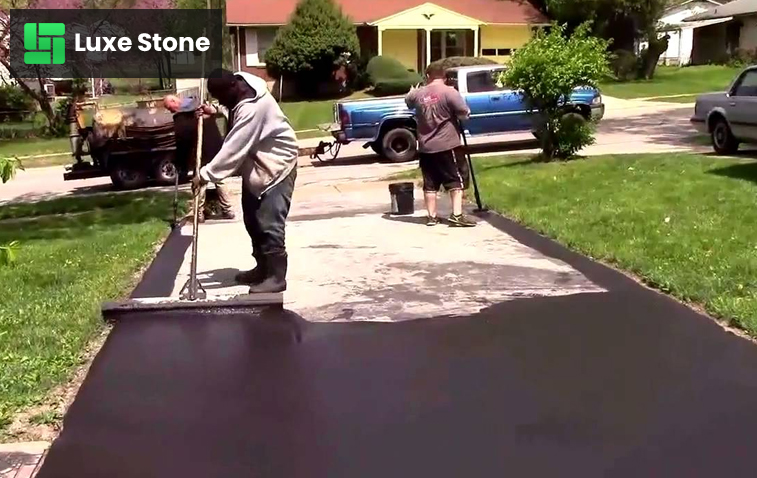Choosing the Right Asphalt Thickness for Your Driveway Needs
A driveway is like a road just for your house. It needs to be strong enough for your cars to drive on it every day. To make a strong driveway, we use something called asphalt. Asphalt is that black, sticky stuff you see on roads. It’s important to have the right amount of asphalt, not too much and not too little. If there is too little asphalt, your driveway might crack and break when cars drive on it. If there is too much, it might be a waste. So, we need to pick the perfect thickness. This perfect thickness helps your driveway last a long time without getting damaged.
Why Thickness Matters
First, let’s talk about why thickness is so important. Think of it like building with LEGO bricks. If you only use a few thin layers, your tower will be wobbly and fall over. Similarly, if the asphalt is too thin, it cannot handle the weight of your car. This can cause cracks, ruts, and even potholes. Potholes are like little holes in the driveway, and nobody wants those! Additionally, a thicker layer of asphalt is stronger and lasts longer. This means you won’t have to fix your driveway as often. Therefore, choosing the right thickness saves time and money.
Next, a thicker asphalt layer spreads the weight of your car over a bigger area. This is like using a wide board to walk across a muddy puddle. The wide board spreads your weight out, so you don’t sink. Similarly, a thicker asphalt layer can handle more weight without breaking. Moreover, proper thickness stops water from going into the ground underneath. Water can weaken the ground and cause the asphalt to break. Thus, the right thickness keeps your driveway strong and dry.
Furthermore, correct asphalt thickness is important for a smooth and safe surface to drive on. Imagine riding your bike on a bumpy path. It’s not very comfortable! Similarly, an uneven driveway makes driving uncomfortable and can even hurt your car. Thus, a good thickness means a smooth surface. Finally, a driveway with the proper thickness looks much nicer. It makes your house look well-cared for. Therefore, choosing the right thickness is a very important decision.
Things That Affect the Thickness
Now, let’s talk about things that decide how thick your asphalt should be. One important thing is how many cars will use the driveway. If only a small car uses it sometimes, you might not need as much asphalt as if big trucks drive on it every day. For example, a family with lots of cars needs a stronger driveway than someone who lives alone.
In addition, the type of soil under your driveway matters. If the soil is soft and squishy, you need more asphalt to hold the weight. For example, if you live in a place with lots of clay, you will need thicker asphalt. Also, if the ground freezes in winter, you need a thicker layer. This is because freezing and melting can make the ground move.
Besides the ground and cars, weather also plays a big role. Places with very hot summers or very cold winters need thicker asphalt. This is because very hot or cold temperatures can damage the asphalt. For example, hot sun can make asphalt soft, while cold weather can make it break easily. Therefore, weather is a very important thing to consider.
Recommended Thickness for Driveways
Generally, for regular family cars, a total thickness of about 6-8 inches is good. This includes a base layer of gravel and the asphalt layer on top. The gravel layer is usually about 4 inches thick. This layer helps water drain away and makes a solid base. Then, the asphalt layer itself should be about 2-4 inches thick.
Furthermore, for bigger and heavier vehicles like trucks or RVs, you need a thicker asphalt layer. This might mean a total thickness of 8-12 inches or even more. The base layer might be 6 inches, and the asphalt layer could be 4-6 inches. Also, it’s always a good idea to talk to someone who builds driveways. They can look at your specific situation and tell you exactly what you need.
Finally, remember these are just general ideas. It’s always best to ask a professional paving contractor. They can look at your specific needs and tell you the best asphalt thickness for your driveway. Therefore, talking to an expert is a very good idea.
Taking Care of Your Asphalt Driveway
After you get your new driveway, you want it to last a long time. So, how do you take care of it? First, try not to park heavy vehicles in the same spot all the time. This can make dents. Also, clean up spills like oil or gasoline right away. These can hurt the asphalt.
Next, sealcoating is a good idea. This is like putting a protective coat on your driveway. It helps protect it from sun, rain, and other damage. Furthermore, you should sealcoat your driveway every few years. This will help it last much longer.
In addition, try to stop water from sitting on your driveway. Make sure water flows away easily. Also, fix any cracks as soon as you see them. Small cracks can become big cracks if you don’t fix them.
Moreover, try not to use de-icing salts in winter if you can. These can damage the asphalt. Instead, use sand to help your tires grip. Therefore, taking good care of your driveway is very important.
FAQs
The type of soil under the driveway really changes how thick the asphalt needs to be. For example, soft or unstable soils, like clay, need a thicker asphalt layer. This is because these soils are not a strong base. Furthermore, the thicker asphalt helps spread the weight of cars more evenly. Also, it stops the driveway from sinking or moving. On the other hand, soils that drain water well and are stable, like gravel, might not need as much asphalt. Therefore, knowing what kind of soil you have is very important for building a good driveway.
A gravel base is super important for a strong and long-lasting asphalt driveway. First, the gravel makes a stable foundation for the asphalt layer. This helps stop it from moving and cracking. Secondly, the gravel lets water drain away from the asphalt. This stops water from sitting on the driveway and hurting it. Thirdly, the gravel layer helps spread the weight of cars more evenly. This makes the asphalt surface last longer. Therefore, the gravel base is a very important part of a well-made driveway.
Sealcoating is like a protective layer you put on asphalt driveways. It helps protect the asphalt from damage caused by the sun, rain, and other things. Usually, it’s a good idea to sealcoat a driveway every two to three years. However, this can change depending on a few things. For example, the weather where you live, how many cars drive on it, and how the driveway looks all matter. Moreover, doing sealcoating regularly helps make the driveway last longer and look its best. Thus, sealcoating is a good thing to do.
Weather really affects asphalt driveways. Very hot summers and very cold winters can hurt the asphalt. For example, hot temperatures can make the asphalt soft, which makes it easier for dents and low spots to form. On the other hand, cold temperatures can make the asphalt brittle and more likely to crack. Additionally, when water freezes and melts over and over, it can make the ground move and damage the driveway. Therefore, weather is an important thing to think about when building and taking care of an asphalt driveway.


